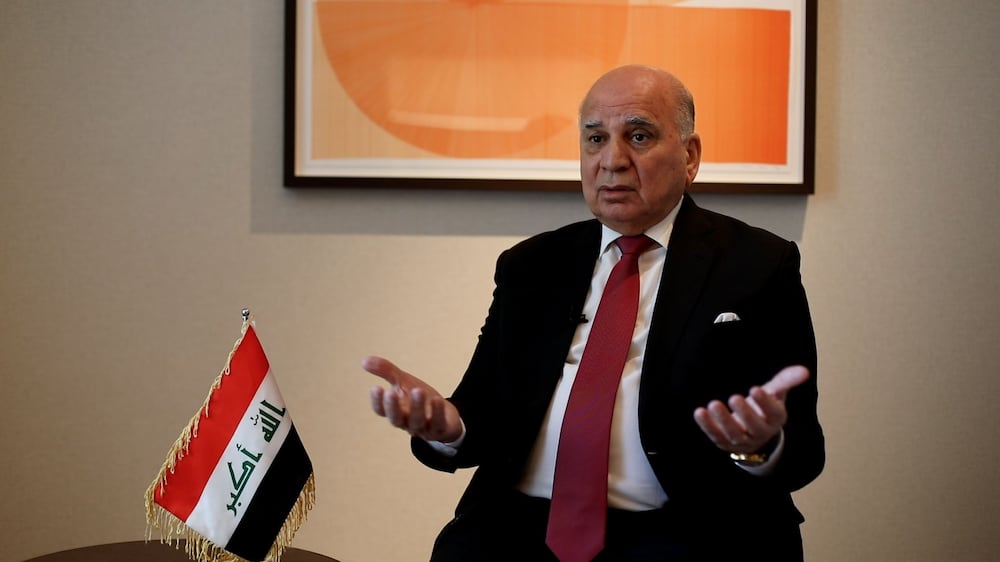Iraq’s Foreign Minister Fuad Hussein described his country’s relationship with the US as “damaged”, but said it was being “repaired”. That is not the only relationship in need of repair, as he also described ties with Iran as “damaged”.
Mr Hussein is a seasoned Iraqi politician and one with a vast network of connections and friendships, from Washington to Tehran. And today, his mission includes negotiating an agreement with the US about the future of the two countries’ military ties and, by extension, their entire bilateral relationship.
Two decades on from the US invasion of Iraq and the fall of Saddam Hussein’s regime, the Iraqi government is seeking to end America’s military footprint in the country.
While this was a policy adopted by Iraqi Prime Minister Mohammed Shia Al Sudani last year, rising tension in the Middle East since the start of the Gaza war has led to numerous militias and Iran-backed groups demanding an immediate end to America’s presence in the region.
However, Mr Hussein explained that there needs to be an assessment of the threats in Iraq before a final decision is made.
Iran further complicated matters last month when it fired missiles into Erbil, the capital of Iraq’s Kurdistan region, killing four civilians and wounding six others.
In an in-depth interview with The National at the Munich Security Conference, Mr Hussein made sure to state the Iraqi government position that “in the first place, the Americans have been invited by the Iraqi government, during the attacks of ISIS terrorists in Iraq, back in 2014”.
However, he said, the time had come to reassess the presence of US forces.
Negotiations have already commenced, with a second round of talks in the framework of a military committee.
Part of the discussions is an assessment of whether Iraq still needs the US, and other allies, to stay in Iraq to ward off the threat of ISIS. The talks will also focus on whether Iraq still needs support in “rebuilding the Iraqi forces”.
Mr Hussein said the ultimate decision on US troops was a political one.
On whether ISIS continues to pose a threat to Iraq, which would provide a reason to extend the US troop presence in the country, Mr Hussein said: “It is difficult to say it is not a threat.”
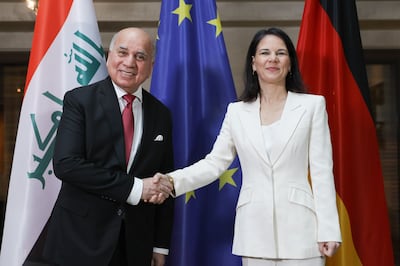
In 2014, ISIS fighters were able to attack Mosul, Iraq’s second city, and “within a few days of their attack, they were able to control Mosul and then they were able, within a few weeks, to control one third of Iraqi territory”.
A decade on, ISIS continues to have small pockets of fighters, “although they are not as strong as before”, Mr Hussein said.
He explained that “we cannot talk about ISIS as only fighters; ISIS is also an ideology … this is one side of the problem. The other side has to do with the fact that there are hundreds of ISIS leaders in prison in Syria under the control of Syrian Democratic Forces”, a Kurdish-led group.
The situation in Syria remains unstable and there are concerns that the hundreds of ISIS members detained in the country could escape, cross the border and reorganise in Iraq.
“Saying ISIS has disappeared is not correct, but also ISIS now is not a threat, but it can be a threat because of these circumstances and because of the fact that the situation in Syria is not stable. Security in Syria affects us directly,” Mr Hussein warned.
Iraq has repeatedly called on global powers to deal with ISIS prisoners in Syria and deport those who are from other countries. However, the matter remains unresolved.
As for whether the potential threat of ISIS could lead to American forces remaining in Iraq, Mr Hussein said: “The message which has been given by the Prime Minister to the members of the Iraqi [negotiating team] is that we want to reach that end, to reach the end of having American and allied troops on Iraqi soil … so the message from the Iraqi side is clear.”
However, the issues that remain include how and when that troop withdrawal happens and the US reaction to this Iraqi decision.
“That's why we are talking about negotiations,” he said.
While the US has the largest military presence in Iraq, other countries are represented as part of the coalition.
“The coalition is led by the Americans, and if the Americans will leave, then it means the others will leave,” Mr Hussein said.
However, there continues to be a keen interest in keeping Nato’s mission in Iraq, which started in 2018 and is explicitly a “non-combat advisory and capacity-building mission”.
Mr Hussein stressed the importance of Nato remaining in Iraq.
“We made it clear that Nato's mission can stay; we need the Nato mission in Iraq,” he said. “Nato's mission established a good relationship with the Ministry of Defence and now, in fact, they enlarged their mandate, giving training to the Federal Police, which belongs to the Ministry of Interior.”
With a continued presence of Nato in Iraq, that means the US and other members of the alliance will remain in the country.
“Nato's mission will stay and this is a decision. The negotiation is not about Nato's mission, it is about American troops and allies,” Mr Hussein said.
Mr Al Sudani met Nato Secretary General Jens Stoltenberg last month in Davos and the two sides agreed to continue developing the role of the alliance.
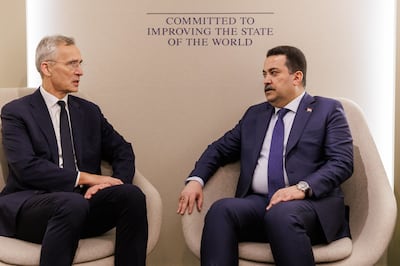
Asked to characterise the relationship with the US, Mr Hussein said: “There were some damages, for the first time after 2003, but we have started to repair it”, clarifying that damage was “because of the attack and counterattack”.
“But we started to repair these damages. As Minister of Foreign Affairs and believing in good relationships with various countries, I know Iraq needs the United States,” he added.
“We consider the United States as an ally – the United States was with us in the fight against ISIS. We did it together. And they have sacrifices inside Iraq, as we do.
“We need to have a very good relationship with the United States. I don't see the relationship with the Americans negatively, but we are talking about how to reshape our relationship.”
There are two distinct camps in the Iraqi political establishment today, according to Mr Hussein.
“One group [is] saying all these troops must leave the country, but there is another one talking about establishing bilateral-level security agreements with these countries.”
He believes “it must be clear for us … we must have the support of other countries; we are in need of that support”, but he sees it as needing to “reshape it, to reorganise it, that's a different story”.
While talks continue with the US, the UN mission in Iraq, or Unami, is also the subject of a review.
“We need a UN mission in Iraq, but in different shape … when it was established Iraq was in a completely different situation, so that means the work of Unami would be different from now,” Mr Hussein said.
“That's why we started to talk with the UN about that”.
A report is expected in March from an independent UN review led by German diplomat Volker Perthes to lay out steps for the UN to change its mission in the country.
Asked whether Iraq wanted to keep some of the UN mission, Mr Hussein promptly said “we need them, but in a different shape”.
Iraqi media was caught up in trying to understand whether the country lodged a formal complaint against Iran after the Erbil attacks last month.
Mr Hussein said: “We sent a letter to the UN Secretary General and the UN Security Council, but asking for a meeting is a different issue.”
While Iraq did not request a meeting about the matter, Mr Hussein commented “the letter is still there”, implying that if such a meeting was needed, it could be requested.
As for how Iraq can be protected from further strikes and retaliatory attacks, Mr Hussein said: “One thing is clear for us, the American-Iranian conflict, of course, goes back to 1979, but nowadays, when there is high tension between both countries; they are sometimes solving their problems on our soil. And we have told both sides this is not acceptable.”
Mr Hussein’s frustration with both sides was clear.
“If the Americans have a problem with the Iranians, then they know where Iran is. And if the Iranians have a problem with the Israelis and with the Americans, then they know how to reach them.”
Mr Hussein and other Iraqi officials have been demanding for years that the US and Iran stop fighting each other on Iraqi soil – but that has not happened.
“Unfortunately, we became the field of solving their problems,” he said.
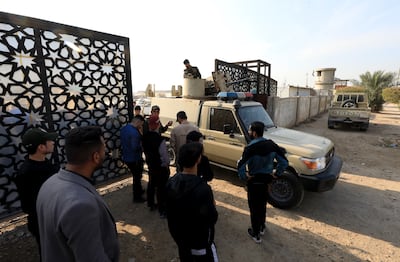
However, Iraq considers both sides allies. Iran-backed militias have struck bases housing American troops and the US has retaliated with attacks on militia bases.
“It is very strange. We have got very good relationship with both sides,” Mr Hussein said.
“So, we consider America an ally and we were together in the fight against ISIS. And Iran is our neighbour and we have an excellent relationship with them, we even reached a security agreement with them. And they were very satisfied and they were thanking us for signing this agreement. Yet they are attacking us. This is not acceptable.”
In the early hours of January 16, Iran struck the home of a well-known Iraqi businessman, killing him and members of his family.
Mr Hussein criticised the missile attack, saying: “The Iranians are claiming they attacked Mossad bases, this is not the first time. This is the second time they are attacking Erbil and using rockets and they know [the accusation of the presence of Mossad] is baseless.
“But they are selling the idea, I don't know to whom, to their public but nobody is believing them … they killed civilians, they killed a family, a child of 11 months. And they are talking about terrorists and a Mossad base. Of course, nobody believes them.”
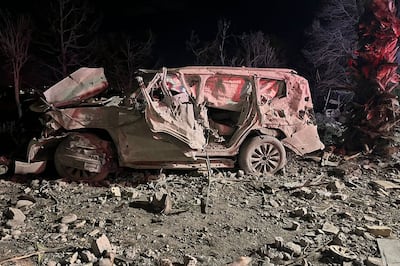
After the first attack on Erbil, Mr Hussein said he travelled to Tehran to discuss the attack and “we told them what you are talking about is baseless”.
“To be honest, even themselves, they didn't know what they are talking about,” he added. “Each official was talking about something else, within that same meeting.”
Now, Mr Hussein said Iraq was waiting for an apology from Iran.
“We need an apology, we need proof … they are talking about a Mossad base, give us proof.”
Mr Hussein warned Tehran that his country can still opt to call for a meeting at the UN Security Council to raise an official complaint.
“If they will continue, of course, then it will be a different story,” he said.
He compared the situation in Iraq with that of Pakistan, which Iran also attacked last month, explaining that “they attacked Pakistan; the day after the Pakistanis attacked them, and then they went to Pakistan to apologise”.
Iraq and Iran are deemed in some ways to be the closest of allies, Mr Hussein said.
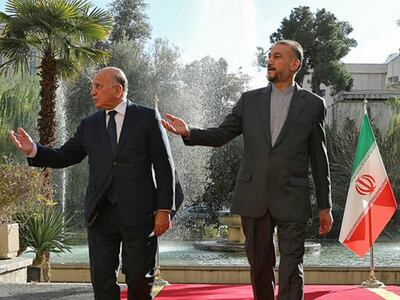
“We are the closest, according to the Iranians … we are neighbours, we have a very, very strong relationship with Tehran and we want to have a good and healthy relationship, but they must not attack us. It is not acceptable.”
As to why Iraq has not taken further measures since the Iranian strikes on Iraq, Mr Hussein said concisely: “We are taking our political environment into consideration – internal, political, otherwise – we have the right to go to the Security Council.”
With major allies of Iran in the Iraqi government, and other armed groups closely affiliated to it, putting further pressure on Tehran would be problematic for Baghdad.
Mr Hussein used the same term to refer to the ties with Iran as he did the US. Asked to describe the relationship with Iran, he responded: “It is still damaged, so we need [an] Iranian initiative. We need an open and rational discussion about our ties. They must not deal with us as if we are their followers.”
Acknowledging the deep ties with Iran, he said: “We respect them, but we are equal. We are a different country; we are not part of Iran”, alluding to the influence of Tehran within many political parties in Iraq.
“Being affected by Iranian policy or not, that's up to the political parties, to be ideological or interconnected, but in the end Iraqi interests will be met within Iraq,” he said.
Mr Hussein stressed the importance of protecting Iraq’s sovereignty, saying: “The decision-making process about Iraq and its society, politics, economy, all must be done in Baghdad and by Iraq's politicians and its people.”
While Mr Hussein acknowledged the presence of external influences, he said: “We have got some influence here and there, but at the end, Iraq must reach that stage in which it decides itself – Iraqis must decide for Iraq. The decision must be taken in Baghdad, not in any other capitals in the world.”
Mr Hussein considers security “my top priority”, adding that “without security, we cannot implement our plans for developing the economy, for having a better society, for strengthening our democratic process”.
He spoke about the many wars and destabilisation Iraq has been through.
“We suffered a lot. We, the Iraqis, we have been in a fight with ourselves and with others for 50 years … perhaps two or three, four generations have been born and educated during wars. That's why we need peace, and to have peace, we need good relationship with our neighbouring countries,” he said.
Mr Hussein would not elaborate further, saying: “Our problems are coming from our neighbouring countries and our solutions will also come from co-operating with our neighbouring countries, so we hope that our neighbouring countries will respect the sovereignty of Iraq, but also respect the choice of the Iraqi people”.
That choice, according to Mr Hussein, is democracy.
“We started our democratic process and we have problems with this process. But the problem is coming often from our neighbouring countries,” he said.
Mr Hussein said due to “these problems that they are creating for us, we are approaching others, otherwise, we don't need others”, in reference to the US presence in Iraq.
He added that his country worked on improving Iranian ties with other countries “in fact, because of these tensions, we were searching for a solution between Iran and other countries and we were helping the Iranians to have a good relationship with others. So, it is very strange as the Iranians are punishing us. This is not fair. Iran must understand that this is not acceptable”.
He stressed repeatedly the need for Iran to respect Iraq's sovereignty.
“Perhaps they are powerful. I mean, compared with Iraq, perhaps they can beat us, but at the end it's not acceptable.”
It was a rare direct criticism from an Iraqi official towards Iran.
Mr Hussein explained: “The majority of Iraqi people are not accepting what the Iranians are doing inside Iraq. And nowadays we are talking about that. In the past, we were talking in our meetings with them about this issue, but nowadays we are publicly talking. We need a different kind of relationship with Iran.”
He said Iraq could not be stable without wider regional stability in Syria.
“Without collective security, the countries will be in danger. So, the security of Iraq is interlinked with security in Syria. But that's also valid for Iran. Security for Iraq is interlinked with Iran,” he said.
“So, if there would be chaos in Iran and Iraq, it will affect Iran. Also, it affects Turkey. So, in neighbouring countries, we need each other to guarantee [the] security of each other and not to create problems for each other.”
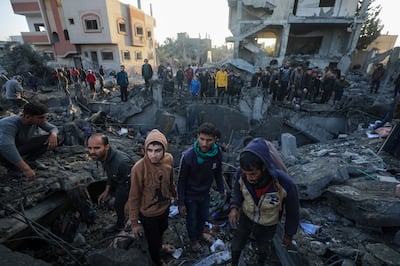
Regionally, Mr Hussein is deeply troubled by the developments in the region, with the war in Gaza raging on.
“I don't know how it will end, but I know the war in Gaza affected the whole region. This is a fact,” he said.
“Military-wise, we have seen attacks and counter-attacks in various areas. But it affects the whole region economically. psychologically, politically.
“And this is a war on TV. Every one sees the war while sitting at home and they see the war and [the] killing [of] people, killing [of] children, deportation of the Palestinian people. Of course, this creates huge, huge reactions. So, it affected many countries around the world, but it affected the area directly.”
Iraq has been directly affected, with Iranian and American strikes rising as they back different sides of the war.
Mr Hussein explained: “For about one year, there wasn't any attack or counterattack. But when the war started, directly, there were reactions from some [Iraqi] groups and they started to attack the Americans based in Iraqi bases, under the slogan that the Americans are supporting the Israelis.”
He spoke at length about the need to end the war, and its effects on Palestine and Iraq, which are also reaching into other countries such as Jordan, Lebanon, Egypt and Yemen.
“It is not only violence but economic effects too … the war has various dimensions, that is why is it important to stop this war,” he said.
Mr Hussein would not delve into whether Iraq would recognise Israel as part of a wider peace plan if such a plan was to be brought into place.
“We must deal with the war and the first step is ceasefire, then, of course, to solve this problem, then the Palestinian issue must be once again on the table and be discussed. We are talking about the right of self-determination of Palestinian people. That means the Palestinians will decide how to deal with the future relationship with other countries,” he said.
But he warned that “without rights for the Palestinians, it will be impossible to have a stable situation in the region … we have seen the normalisation process. Some people were thinking that if we would reach normalisation with the majority of Arab countries, then the Palestinian issue will be solved, but the reality told us something else.”
“The reality is that you must start with the Palestinian people because the problem is there and they have the right and to exercise their right of self-determination,” he said.
